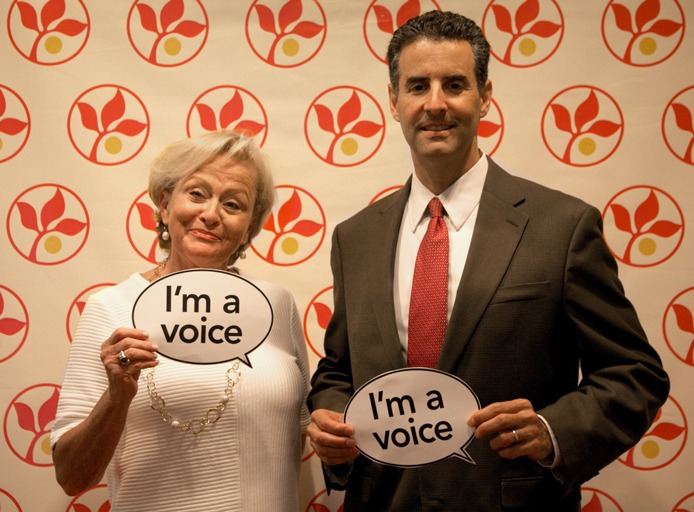Hunger Action Symposium Strengthens Collaborative Partner Efforts

On Sept. 27, the Maryland Food Bank hosted the “Be A Voice” Hunger Action Symposium at the BWI Marriott for more than 280 community leaders, speakers, and guests.
As the leading force behind the Northside Baptist Church’s food pantry, Betty Smith is dedicated to doing whatever it takes to make sure people have access to food in the Baltimore neighborhood surrounding the church.
“I don’t think there should be a hungry person anywhere,” she said. “The sad part is there are so many people who either can’t get to the pantry or won’t come because they’re too proud. But I want to reach them, I want to find out how to let them know we are here to help.”
Like many of the Maryland Food Bank’s community partners, Smith turned to our network of partner organizations for advice while attending the “Be A Voice” Hunger Action Symposium on Friday, Sept. 27. Smith was one of more than 280 attendees who showed up to the conference eager to hear from speakers, experts, and other hunger-fighting community organizations.
Several years ago, Smith attended the conference and met several people who helped her start the church’s pantry. The following spring, the pantry opened to serve about 18 families. This fall, the program has grown to serve more than 70 families each month.
“This is the fourth time I have come to this event,” Smith said. “I enjoy it because every time I come, I always hear about something another person is doing and it helps me improve on what I already have going on.”
Smith was happy to hear Beth Martino’s address, which included a rundown of plans for the upcoming year. Martino, President and CEO of the Maryland Food Bank, also participated in a Q & A session that allowed attendees to raise questions on the spot. When asked how to combat the stigma associated with asking for food assistance, Martino said it’s important for the network to understand why people are going hungry and to tackle those issues, but to first address the need.
“When someone shows up and they need food and they are hungry, they need to be fed,” she said. “It’s a basic human need.”
Ami McReynolds, senior vice president of network development at Feeding America, was also part of the session and encouraged others to advocate.
“Hunger is not an issue that we can easily see,” she said. “And it is likely because of the stigma that people hide their need… They need us to be a voice for them.”
As the keynote speaker, McReynolds highlighted how the national hunger-relief organization plans to end hunger by 2025 by focusing on nutrition, identifying pathways to end hunger, and engaging others.
“We believe strongly that we can chart a new path toward food security,” she said. “But we cannot end hunger alone…we can all stand together and make a difference.”
She also encouraged community leaders to share what they’ve learned about their clients with food bank leaders and each other.
“Storytelling is a really powerful way to get people to think about things in a different perspective and sometimes change hearts and minds,” she said.
Sister Simone Campbell, a Roman Catholic nun who is leading a charge to advocate for economic justice, addressed the crowd during a lunchtime keynote and talked about the power of storytelling as well, noting how influential one’s voice can really be.
“Folks who are struggling often have trouble advocating for themselves,” she said after her presentation. “It’s the exception for those who have the courage to be that vulnerable in public, and I think we have a responsibility to share their stories… to share the story they’re willing to tell.”
In addition to the morning general session, afternoon panels and workshops offered suggestions on pantry design, nutrition education, and fundraising, among other topics. Each discussion was focused on creating a collaborative environment to help encourage partner organizations to work together toward a common goal.
For Smith, that meant connecting with other community organizations to help her church’s pantry reach more people in need.
“As a partner, I’m hoping to grow where we can open once a week instead of monthly,” she said. “It’s hard for people to stay hungry for 30 days and I’m learning how the other (community organizations) were able to do it by coming here and going to workshops and listening.”
Get updates on our progress in the fight against hunger
Want to see how your involvement directly impacts the well-being of your neighbors in need? Get the latest news sent to your inbox.





